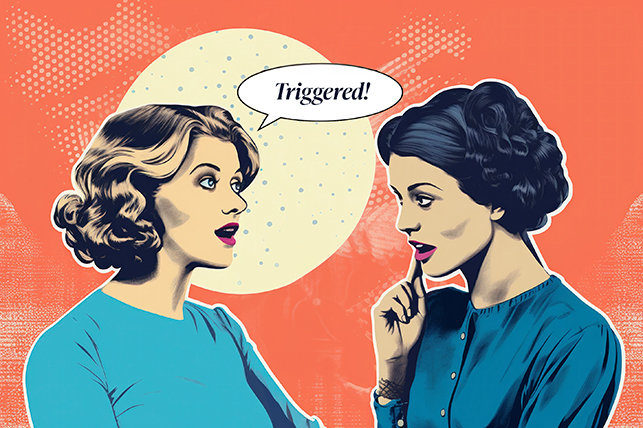Does Normalizing 'Therapy Speak' Help or Hurt Our Relationships?

Key Points
- Terms such as "triggered," "trauma" and "boundaries" have become used increasingly in everyday communication, making it more normalized.
- Using therapeutic language can have a positive impact on relationships by helping individuals express their emotions and needs more clearly.
- The misuse of therapeutic terms can be harmful when used to manipulate or control others.
If you're in a relationship or spend time on social media, you may have noticed a collection of phrases or terms in our cultural zeitgeist.
"Therapy speak"—a collection of terms traditionally used by mental health professionals in a therapeutic setting—is becoming more and more normalized, providing us with new ways to express emotions and navigate conflict.
Some of the most commonly used terms include "triggered," "trauma" and "boundaries."
The normalization of these terms and their transition into our everyday language is thanks to a rise in individuals undergoing therapy and an increasing presence of mental health professionals who share their expertise via social media platforms such as TikTok, Instagram and X (formerly known as Twitter).
About 41.7 million adults in the United States received treatment or counseling for their mental health in 2021 as compared to about 27.2 million in 2002, according to a 2023 study.
However, the awareness of therapy speak ramped up earlier this summer when actor Jonah Hill's ex-girlfriend accused him of being "emotionally abusive," largely because of how he used these phrases.
Professional surfer Sarah Brady shared screenshots of her text messages with Hill in which he listed several things he would not allow her to do: surf with men, model, post photos of herself in a bathing suit and more. He referred to the list of requests as his "boundaries."
Hill has been an outspoken advocate for therapy and has shared openly about his mental health journey. However, these allegations against him have led many to question whether the use of these therapeutic terms helps or hurts relationships.
According to experts, the normalization of therapy speak does both, depending on how we deploy them.
Recommended
- What Is Rejection Therapy?: This social self-help game may help you gain more confidence in your dating life.
- Human Error In Talk Therapy: Weird vibes? Strange turns-of-phrase? How to tell if a therapist isn't the right fit for you.
- Why OB-GYNs Are Offering Botox Injections: You trust your OB-GYN with your sexual health. Now, some are offering cosmetic procedures, too.
The good
"[Increased use of these terms] may signal that people are more open to seeking support and are simply learning about and using new language to describe their experiences," said Shauna "Doc" Springer, Ph.D., a San Francisco-based relationship expert and the chief psychologist and founder of mental health provider Stella. "The normalization of therapeutic language can indicate that there is less stigma around the idea of seeking help and that more people are learning new concepts because they're getting help. That's a good thing."
In many instances, understanding these terms and then using them in our personal lives can help us express needs and feelings more clearly, leading to better relationships, she said.
Imagine a situation where a partner aggressively raises their voice and says, "You're so irresponsible. Our checking account is in the red again. I can't trust you at all!" This kind of situation would likely put the other person into a "fight-or-flight" response—our automatic physiological reaction to an event that we perceive as stressful—Springer said.
In other words, it would likely be triggering for the person, and using this precise term to explain to their partner that their behavior was upsetting can help ensure they go about the confrontation in a less aggressive way going forward.
"Using therapy speak can increase awareness and understanding of mental health issues, reduce stigma and encourage open conversations about emotions and boundaries," said Petra Frese, Ph.D., a relationship expert in Allentown, Pennsylvania, and the author of "Your Script for Intimacy." "It can provide a shared language for individuals to express their feelings and needs."
The bad
Therapy speak can be harmful when terms are misused and weaponized to assert dominance, manipulation and control.
"If someone disguises control and emotional abuse as 'boundaries,' it's a serious concern," Frese said. "This type of manipulation distorts the concept of boundaries, which are typically meant to establish healthy limits and respect between individuals."
In Hill's relationship, for example, he used the word "boundaries" to refer to ways in which he was attempting to control his partner. But in reality, she said, boundaries are not about the other person. They're about you. Setting boundaries is about defining a space and a set of rules to establish who and what we allow into our realm and what we don't.
"Boundaries are guardrails, not limitations," she said.
Using these terms can become harmful when one partner uses the idea of "being triggered" to avoid conflict at all costs, Springer said.
An example is if one partner respectfully says to the other, "I really need to talk to you about how we're overspending our money," and the other responds that they are "triggered" by the thought of having a conversation about money. This makes it impossible to resolve the issue.
In this case, the therapeutic term is being used as a tool for avoidance.
"Couples in healthy relationships need to fight," Springer said. "In healthy close relationships, partners approach and resolve conflicts in a productive way. So when words like these are used to avoid conflict, that will ultimately harm the relationship."
Common Bra Myths You Probably Believe, Debunked: Forget everything you think you know about the ubiquitous undergarment. To help separate fact from fiction, experts have answered our burning bra-related questions.
How to know the difference
Rather than using these terms in whatever way is convenient, Frese noted it's important to ensure you understand their true meaning before using them in your relationships. To do this, talk to a real mental health therapist.
"Mental health professionals can provide insights into healthy communication patterns, the appropriate use of therapy concepts in daily life and the warning signs of dysfunctional or manipulative behavior," she said. "Remember that mental health is a complex and nuanced topic and seeking professional guidance is crucial for a thorough understanding."
Ultimately, it's important to think about whether your partner is an emotionally healthy and emotionally safe person, Springer said. That means:
- Someone who consistently treats you with respect.
- Someone who can be confronted when they hurt you without getting defensive or angry.
- Someone who takes responsibility for their own mistakes.
- Someone who can be trusted with your vulnerabilities.
"If you're with this kind of person, it's very unlikely that they'll weaponize any kind of therapy speak to manipulate or control you," Springer said.


















